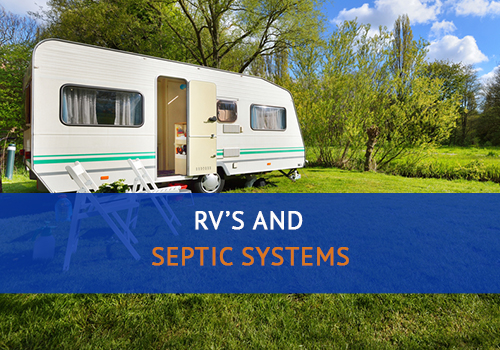It’s summertime, which means vacations and family camping trips! Some of you may like camping with just a pack and tent on your bike, while others of you may enjoy the outdoors from the luxury of an RV.
Yes, recreational vehicles. They’re home on wheels, complete with bedrooms, a kitchen, and (that’s right) a bathroom. This means that RVs come with their septic systems. You’d be surprised to learn that you can apply your knowledge of residential septic systems to your RV’s system. But, there is always room for a few new tips about RV’s and septic systems.
Let’s take a look back over some of our most important topics to ensure that you’re applying the right septic care.

RV’s and Septic Systems
RV’s and septic systems require a delicate balance. From treating your RV system with care to following all the proper rules to dump RV waste into your septic system, it takes some knowledge to know what is right.
Following “Do Not Flush” Rules
There’s a whole list of items that you cannot flush. Septic systems are made of delicate ecosystems, where bacteria work hard to break down solid waste. To prevent disrupting your system’s healthy bacteria county, be careful about what you put into your RV’s toilet and sink.
For a general rule, we suggest you keep your flushing down to human waste and toilet paper. Let’s take a look at a quick list of things you should not be flushing into that RV septic system (or your residential system)
- Feminine products
- Disposable Wipes (turns out these aren’t disposable)
- Pharmaceuticals
- Grease/Greasy food
- Diapers
- Floss
- Coffee Grounds
- Vegetables
- Rice
- Bleach
Dumping Your RV Septic Tank
Many campgrounds (especially those with RV hookups) will dump your RV tank (either for free or for a fee).
Other providers like septic companies and gas stations will as well. However, it’s important to ensure that you have the correctly sized hose to match these providers. Residential/commercial septic companies often have larger hoses than the typical RV outlets.
But, what about dumping your RV tank into your residential septic system?
Can You Dump RV Waste Into Your Septic System?
Technically yes, but this affirmative depends on a lot of factors. As a residential septic owner, you must be aware of your abilities and knowledge about your system.
Chemicals
The septic system is part of a natural and delicate process that quickly can change from stable to unstable. The main concern about dumping into your home septic system is foreign chemicals.
The chemicals used in an RV septic tank can damage your home tank’s ecosystem by killing off the good bacteria. When this happens, the rest of your residential septic system can back up or flood, causing damages that you will have to repair or replace.
The EPA says, “Mixing chemicals with waste in sewage holding tanks or septic systems may produce toxic fumes, corrode pipelines and tanks, and pollute soil and groundwater when discharged.” Long story short, don’t dump into your home septic tank.
Your Tank
Each septic system is different, including tank size. Depending on the amount of wastewater your household creates, you could have a small or large tank. If your tank is too small, it could end up backing up your system or flooding.
If your tank is already full and needs pumping, you may overdo it by dumping too much. This can also lead to your system backing up into your house or flooding in your drainfield.
Health
Working around a septic system is dangerous in general because of hazardous gases illness-causing pathogens, and possible injury. Opening your septic tank can be dangerous. Not only could you injure yourself falling in, but chemicals (like methane and ammonia) or pathogens in the tank can cause you to become physically sick.
So, unless you want to end up calling a septic professional or a doctor to make a house call, we do not suggest dumping into your home septic system. It may seem easy and time efficient, but it’s not when you consider the bigger picture.
Should I Use Additives in My RV Septic?
We know that chemicals can affect the health of your septic tank. It may be tempting to use additives to keep the odor under control or to boost the bacterial processes occurring in the tank. But there are a few things you should consider before doing this.
- Your septic tank may be made of a different material than your residential system. That means that they cannot withstand harsh chemicals. You may want to inspect your hoses and connections before deciding what’s best for your septic situation. (You might consider this with your toilet bowl cleaner too.)
- Additives are not a fix all for RVs. The best way to get rid of odors and the solid waste in the tank is to plan on routine dumps and cleans. It’s just like your residential septic system – regular maintenance is vital!
- There are several different types of additives, and they contain various chemical ingredients. It’s essential to find the ones that work best for your particular systems.
RV’s and septic systems can get along — if you treat them right! Have questions? Give us a call at (352) 242-6100 at Advanced Septic Services.

